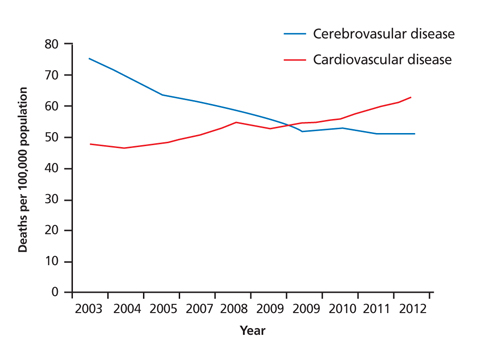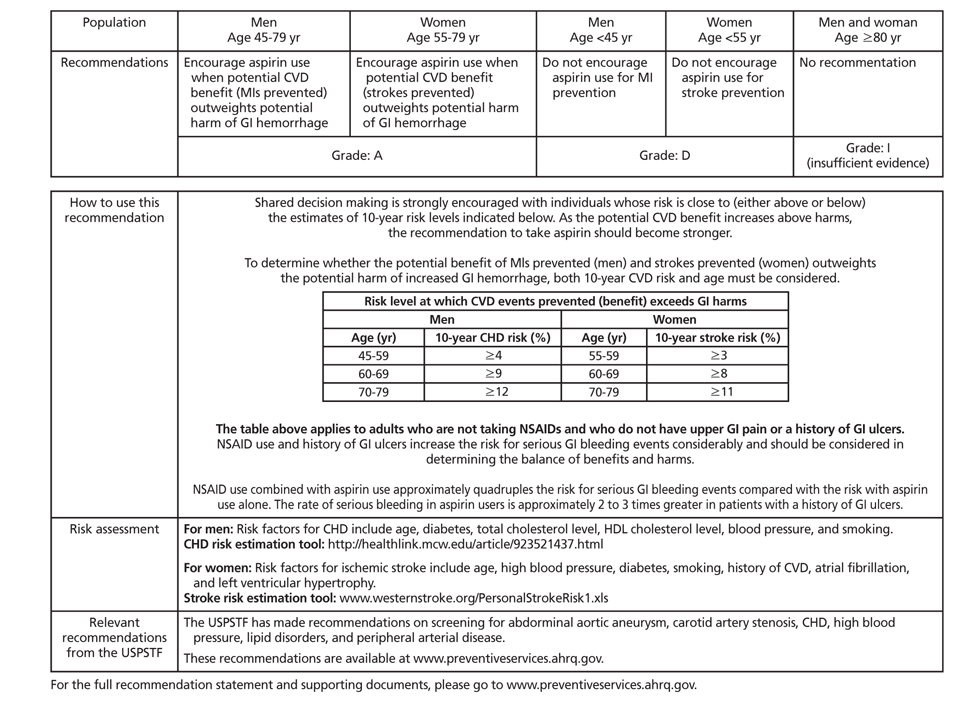J Korean Med Assoc.
2014 Apr;57(4):348-356. 10.5124/jkma.2014.57.4.348.
Aspirin in the prevention of cardiovascular disease and cancer
- Affiliations
-
- 1Department of Family Medicine, Hallym University School of Medicine, Chuncheon, Korea. lull@hallym.ac.kr
- KMID: 2064893
- DOI: http://doi.org/10.5124/jkma.2014.57.4.348
Abstract
- Cardiovascular disease (CVD) is the one of the leading causes of death in Korea. Aspirin, well known for its antiplatelet function, has been used for the secondary prevention of CVD during the first few several decades. However, whether or not to have a protective effect on the primary prevention of CVD in apparently healthy people is still controversial. In addition, accumulating data suggest aspirin may have a favorable possibility on cancer incidence and mortality. We reviewed the literature, focusing on new evidence on the benefits and risks of aspirin for the prevention of CVD and cancer. Aspirin modestly decreases the risk of non-fatal myocardial infarction and cancer incidence in patients without overt CVD and at average cancer risk, but increase the risk of major bleeding. Several guidelines on the use of aspirin for the primary prevention of CVD stated the need for the prudent assessment of individual CVD risks in the target population. Currently there's no CVD risk assessment tools based on domestic data available in Korea. Also the bleeding risk and relatively high incidence of hemorrhagic stroke in Koreans make a difficult decision. Clinicians should give the patients a balanced information and discuss the effects or harms of taking aspirin on the prevention of CVD and cancer according to the updated evidence. Patient education for the prevention of CVD is more important and life style change including smoking cessation, weight reduction, and a healthy diet should be emphasized before considering aspirin.
MeSH Terms
Figure
Reference
-
1. World Health Organization. The top 10 causes of death [Internet]. Geneva: World Health Organization;2011. cited 2013 Dec 27. Available from: http://www.who.int/mediacentre/factsheets/fs310/en/index.html.2. World Health Organization. Cancer fact sheet [Internet]. Geneva: World Health Organization;2013. cited 2013 Dec 27. Available from: http://www.who.int/mediacentre/factsheets/fs297/en.3. Park HS. Statistical analytic data of mortality and causes of deaths, 2012. Daejeon: Korea National Statistical Office;2013.4. Antiplatelet Trialists' Collaboration. Collaborative overview of randomised trials of antiplatelet therapy I: prevention of death, myocardial infarction, and stroke by prolonged antiplatelet therapy in various categories of patients. BMJ. 1994; 308:81–106.5. Hong KS, Yu KH, Rha JH, Kim HY, Koo J, Park JM, Seo DH, Park IS, Cho KH, Jung KH, Park TH, Lee BC, Yoon BW. Review of evidences and updates of the Korean clinical practice guidelines for Stroke in 2013. J Korean Neurol Assoc. 2013; 31:143–157.6. Patrono C, Ciabattoni G, Patrignani P, Pugliese F, Filabozzi P, Catella F, Davi G, Forni L. Clinical pharmacology of platelet cyclooxygenase inhibition. Circulation. 1985; 72:1177–1184.
Article7. ASGE Standards of Practice Committee. Anderson MA, Ben-Menachem T, Gan SI, Appalaneni V, Banerjee S, Cash BD, Fisher L, Harrison ME, Fanelli RD, Fukami N, Ikenberry SO, Jain R, Khan K, Krinsky ML, Lichtenstein DR, Maple JT, Shen B, Strohmeyer L, Baron T, Dominitz JA. Management of antithrombotic agents for endoscopic procedures. Gastrointest Endosc. 2009; 70:1060–1070.
Article8. Ono S, Fujishiro M, Kodashima S, Takahashi Y, Minatsuki C, Mikami-Matsuda R, Asada-Hirayama I, Konno-Shimizu M, Tsuji Y, Mochizuki S, Niimi K, Yamamichi N, Kaneko M, Yatomi Y, Koike K. Evaluation of safety of endoscopic biopsy without cessation of antithrombotic agents in Japan. J Gastroenterol. 2012; 47:770–774.
Article9. Van Oijen MG, Dieleman JP, Laheij RJ, Sturkenboom MC, Jansen JB, Verheugt FW. Peptic ulcerations are related to systemic rather than local effects of low-dose aspirin. Clin Gastroenterol Hepatol. 2008; 6:309–313.
Article10. Silverstein FE, Faich G, Goldstein JL, Simon LS, Pincus T, Whel-ton A, Makuch R, Eisen G, Agrawal NM, Stenson WF, Burr AM, Zhao WW, Kent JD, Lefkowith JB, Verburg KM, Geis GS. Celecoxib Long-term Arthritis Safety Study. Gas-trointestinal toxicity with celecoxib vs nonsteroidal anti-inflam-matory drugs for osteoarthritis and rheumatoid arthritis: the CLASS study: a randomized controlled trial. JAMA. 2000; 284:1247–1255.
Article11. Becker RC, Meade TW, Berger PB, Ezekowitz M, O'Connor CM, Vorchheimer DA, Guyatt GH, Mark DB, Harrington RA. American College of Chest Physicians. The primary and secondary prevention of coronary artery disease: American College of Chest Physicians Evidence-Based Clinical Practice Guidelines (8th edition). Chest. 2008; 133:776S–814S.12. Antithrombotic Trialists' (ATT) Collaboration. Baigent C, Blackwell L, Collins R, Emberson J, Godwin J, Peto R, Buring J, Hennekens C, Kearney P, Meade T, Patrono C, Roncaglioni MC, Zanchetti A. Aspirin in the primary and secondary prevention of vascular disease: collaborative meta-analysis of individual participant data from randomised trials. Lancet. 2009; 373:1849–1860.
Article13. Seshasai SR, Wijesuriya S, Sivakumaran R, Nethercott S, Erqou S, Sattar N, Ray KK. Effect of aspirin on vascular and nonvascular outcomes: meta-analysis of randomized controlled trials. Arch Intern Med. 2012; 172:209–216.
Article14. Greving JP, Buskens E, Koffijberg H, Algra A. Cost-effectiveness of aspirin treatment in the primary prevention of cardiovascular disease events in subgroups based on age, gender, and varying cardiovascular risk. Circulation. 2008; 117:2875–2883.
Article15. Ridker PM, Cook NR, Lee IM, Gordon D, Gaziano JM, Manson JE, Hennekens CH, Buring JE. A randomized trial of low-dose aspirin in the primary prevention of cardiovascular disease in women. N Engl J Med. 2005; 352:1293–1304.
Article16. US Preventive Services Task Force. Aspirin for the prevention of cardiovascular disease: US Preventive Services Task Force re-commendation statement. Ann Intern Med. 2009; 150:396–404.17. Pignone M, Alberts MJ, Colwell JA, Cushman M, Inzucchi SE, Mukherjee D, Rosenson RS, Williams CD, Wilson PW, Kirkman MS. Aspirin for primary prevention of cardiovascular events in people with diabetes: a position statement of the American Dia-betes Association, a scientific statement of the American Heart Association, and an expert consensus document of the Ameri-can College of Cardiology Foundation. Circulation. 2010; 121:2694–2701.
Article18. Lee HY. Effects of antiplatelet drugs in cardiovascular prevention. Korean J Med. 2013; 85:15–21.
Article19. Wilson PW, D'Agostino RB, Levy D, Belanger AM, Silbershatz H, Kannel WB. Prediction of coronary heart disease using risk factor categories. Circulation. 1998; 97:1837–1847.
Article20. Ahn KA, Yun JE, Cho ER, Nam CM, Jang Y, Jee SH. Framingham equation model overestimates risk of ischemic heart disease in Korean men and women. Korean J Epidemiol. 2006; 28:162–170.21. Jee SH. Risk-estimating tool of cardiovascular diseases in Korean population. J Korean Soc Lipidol Atheroscler. 2008; 18:126–130.22. Perk J, De Backer G, Gohlke H, Graham I, Reiner Z, Verschuren M, Albus C, Benlian P, Boysen G, Cifkova R, Deaton C, Ebrahim S, Fisher M, Germano G, Hobbs R, Hoes A, Karadeniz S, Mezzani A, Prescott E, Ryden L, Scherer M, Syvanne M, Scholte op Reimer WJ, Vrints C, Wood D, Zamorano JL, Zannad F. European Association for Cardiovascular Prevention & Rehabi-litation (EACPR). ESC Committee for Practice Guidelines (CPG). European Guidelines on cardiovascular disease prevention in clinical practice (version 2012). The Fifth Joint Task Force of the European Society of Cardiology and Other Societies on Cardiovascular Disease Prevention in Clinical Practice (con-stituted by representatives of nine societies and by invited experts). Eur Heart J. 2012; 33:1635–1701.23. Okada S, Morimoto T, Ogawa H, Sakuma M, Soejima H, Nakayama M, Sugiyama S, Jinnouchi H, Waki M, Doi N, Horii M, Kawata H, Somekawa S, Soeda T, Uemura S, Saito Y. Investigators for the Japanese Primary Prevention of Atherosclerosis with Aspirin for Diabetes (JPAD) trial. Effect of low-dose aspirin on primary prevention of cardiovascular events in Japanese dia-betic patients at high risk. Circ J. 2013; 77:3023–3028.
Article24. Ogawa H, Nakayama M, Morimoto T, Uemura S, Kanauchi M, Doi N, Jinnouchi H, Sugiyama S, Saito Y. Japanese Primary Prevention of Atherosclerosis With Aspirin for Diabetes (JPAD) Trial Investigators. Low-dose aspirin for primary prevention of atherosclerotic events in patients with type 2 diabetes: a randomized controlled trial. JAMA. 2008; 300:2134–2141.
Article25. Soejima H, Ogawa H, Morimoto T, Nakayama M, Okada S, Sakuma M, Uemura S, Kanauchi M, Doi N, Jinnouchi H, Sugiyama S, Waki M, Saito Y. JPAD Trial Investigators. Aspirin possibly reduces cerebrovascular events in type 2 diabetic patients with higher C-reactive protein level: subanalysis from the JPAD trial. J Cardiol. 2013; 62:165–170.
Article26. Dube C, Rostom A, Lewin G, Tsertsvadze A, Barrowman N, Code C, Sampson M, Moher D. U.S. Preventive Services Task Force. The use of aspirin for primary prevention of colorectal cancer: a systematic review prepared for the U.S. Preventive Services Task Force. Ann Intern Med. 2007; 146:365–375.
Article27. Cook NR, Lee IM, Gaziano JM, Gordon D, Ridker PM, Manson JE, Hennekens CH, Buring JE. Low-dose aspirin in the primary prevention of cancer: the Women's Health Study. A randomized controlled trial. JAMA. 2005; 294:47–55.
Article28. Rothwell PM, Wilson M, Elwin CE, Norrving B, Algra A, Warlow CP, Meade TW. Long-term effect of aspirin on colorectal cancer incidence and mortality: 20-year follow-up of five randomised trials. Lancet. 2010; 376:1741–1750.
Article29. Rothwell PM, Price JF, Fowkes FG, Zanchetti A, Roncaglioni MC, Tognoni G, Lee R, Belch JF, Wilson M, Mehta Z, Meade TW. Short-term effects of daily aspirin on cancer incidence, mortality, and non-vascular death: analysis of the time course of risks and benefits in 51 randomised controlled trials. Lancet. 2012; 379:1602–1612.
Article30. Cook NR, Lee IM, Zhang SM, Moorthy MV, Buring JE. Alternate-day, low-dose aspirin and cancer risk: long-term observational follow-up of a randomized trial. Ann Intern Med. 2013; 159:77–85.
Article31. Rothwell PM, Fowkes FG, Belch JF, Ogawa H, Warlow CP, Meade TW. Effect of daily aspirin on long-term risk of death due to cancer: analysis of individual patient data from randomised trials. Lancet. 2011; 377:31–41.
Article32. Derry S, Loke YK. Risk of gastrointestinal haemorrhage with long term use of aspirin: meta-analysis. BMJ. 2000; 321:1183–1187.
Article33. Earnshaw SR, Scheiman J, Fendrick AM, McDade C, Pignone M. Cost-utility of aspirin and proton pump inhibitors for primary prevention. Arch Intern Med. 2011; 171:218–225.
Article34. Lanza FL, Chan FK, Quigley EM. Practice Parameters Commit-tee of the American College of Gastroenterology. Guidelines for prevention of NSAID-related ulcer complications. Am J Gastroenterol. 2009; 104:728–738.
Article35. Bhatt DL, Scheiman J, Abraham NS, Antman EM, Chan FK, Furberg CD, Johnson DA, Mahaffey KW, Quigley EM. American College of Cardiology Foundation Task Force on Clinical Expert Consensus Documents. ACCF/ACG/AHA 2008 expert consensus document on reducing the gastrointestinal risks of antiplatelet therapy and NSAID use: a report of the American College of Cardiology Foundation Task Force on Clinical Expert Consensus Documents. Circulation. 2008; 118:1894–1909.
Article36. Burn J, Gerdes AM, Macrae F, Mecklin JP, Moeslein G, Olschwang S, Eccles D, Evans DG, Maher ER, Bertario L, Bisgaard ML, Dunlop MG, Ho JW, Hodgson SV, Lindblom A, Lubinski J, Morrison PJ, Murday V, Ramesar R, Side L, Scott RJ, Thomas HJ, Vasen HF, Barker G, Crawford G, Elliott F, Movahedi M, Pylvanainen K, Wijnen JT, Fodde R, Lynch HT, Mathers JC, Bishop DT. CAPP2 Investigators. Long-term effect of aspirin on cancer risk in carriers of hereditary colorectal cancer: an analysis from the CAPP2 randomised controlled trial. Lancet. 2011; 378:2081–2087.
Article37. Hankey GJ, Eikelboom JW. Aspirin resistance. Lancet. 2006; 367:606–617.
Article38. Lee YK, Kim HS, Park JY, Kang HJ. Incidence of aspirin resistance in the patient group of a university hospital in Korea. Korean J Lab Med. 2008; 28:251–257.
Article39. Vandvik PO, Lincoff AM, Gore JM, Gutterman DD, Sonnenberg FA, Alonso-Coello P, Akl EA, Lansberg MG, Guyatt GH, Spencer FA. American College of Chest Physicians. Primary and secondary prevention of cardiovascular disease: Antithrombotic Therapy and Prevention of Thrombosis, 9th ed: American College of Chest Physicians Evidence-Based Clinical Practice Guidelines. Chest. 2012; 141:e637S–e668S.
- Full Text Links
- Actions
-
Cited
- CITED
-
- Close
- Share
- Similar articles
-
- Aspirin for Primary Prevention of Cardiovascular Disease
- Can an Aspirin a Day Keep the Colorectal Cancer Away?
- Aspirin and Non-steroidal Anti-inflammatory Drugs in Prevention of Gastric Cancer
- Effects of Antiplatelet Drugs in Cardiovascular Prevention
- Aspirin Usage Based on Evidence for the Prevention of Cardio-Cerebrovascular Disease



